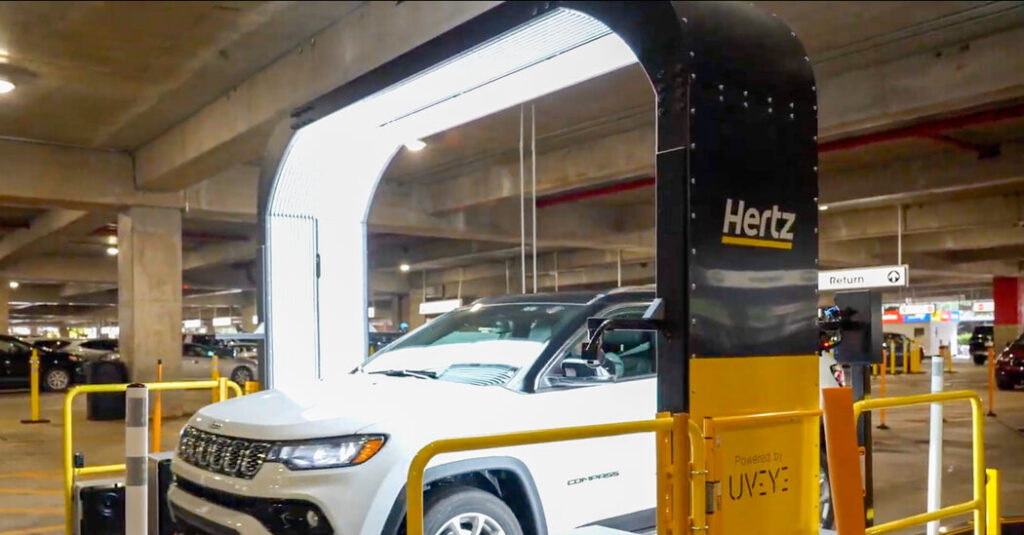AI Technology in Rental Car Inspections Raises Concerns
As the Labor Day weekend approaches, many Americans are preparing for road trips, prompting rental car companies to implement innovative yet controversial artificial intelligence (AI) technologies to inspect vehicles for damage. While this advancement aims to streamline operations, it has led to heightened scrutiny from lawmakers and consumer advocates.
Concerns from Consumers
Numerous customers have voiced their frustrations over unexpected repair charges upon returning rented vehicles. Adam Foley, a recent Hertz customer, experienced this first-hand after renting a car during a family vacation to Atlanta. Upon his return to San Antonio, he received automated notifications claiming he was liable for $350 due to minor damages he allegedly caused, which he was unaware of at the time. Foley described the situation as “extortive” in a LinkedIn post, expressing his disbelief over being charged for damages he couldn’t even detect.
Behind the Technology
The damages in Foley’s case were identified by AI-driven photo booths, developed by UVeye, a technology firm based in New Jersey. These booths document thousands of high-quality photographs of the vehicles both before and after rentals. Currently, Hertz is testing this inspection system at 10 airports across the United States, with intentions to expand its use nationwide.
According to Hertz, the previous manual inspection processes often led to confusion and inconsistency. Their statement emphasized that the AI-driven method introduces a level of precision and transparency that was previously lacking. “With digital vehicle inspections, we’re offering improved objectivity to build customer trust,” Hertz articulated.
Legal and Legislative Inquiries
The usage of AI technology has caught the attention of lawmakers. Senator Richard Blumenthal from Connecticut has reached out to Hertz’s CEO, seeking clarification on how these new inspections are conducted, particularly regarding the fairness of the charges presented to customers. Additionally, Representative Nancy Mace of South Carolina has echoed similar sentiments in her communications to the company.
Consumer advocate Lindsay Owens noted the possibility of misidentifications due to the nature of AI assessments, where some customers have disputed damage claims thinking they might be mere shadows or reflections instead of actual marks.
Industry Response and Utilization
While Hertz embraces this new technology, other rental companies are at varying stages of adoption. Sixt confirmed its use of AI-based technology at selected locations, whereas Avis has opted for a primarily human-led damage assessment process despite previous exploration into AI. Enterprise Mobility, on the other hand, doesn’t currently employ these AI inspections.
UVeye asserts that its scanning systems inspect millions of vehicles monthly across various platforms, including dealerships and service centers. The technology is finely tuned to detect various levels of damage, aiming to reduce ambiguity and enhance customer satisfaction.
Consumer Experiences
In a recent scenario involving the AI inspections at Hertz, a CBS News crew reported a lack of transparency regarding the technology in use. Upon renting a vehicle, there was no notification provided about the AI system’s implementation, and they were unable to view the initial images taken of the vehicle. Interestingly, they received no bills for any alleged damages.
As for Foley, who now advises companies on AI utilization, he expressed that he likely would have chosen a different rental service had he been aware of the AI inspections beforehand. “I shouldn’t have to worry about minor incidents like rocks hitting my car,” he remarked. He is relieved to have had the charges dropped, attributing his resolution to the media coverage his case received.
| Rental Company | AI Inspection Use |
|---|---|
| Hertz | Now using at select locations |
| Sixt | Implemented at select locations |
| Avis | Explored AI but remains human-led |
| Enterprise Mobility | Does not utilize |

